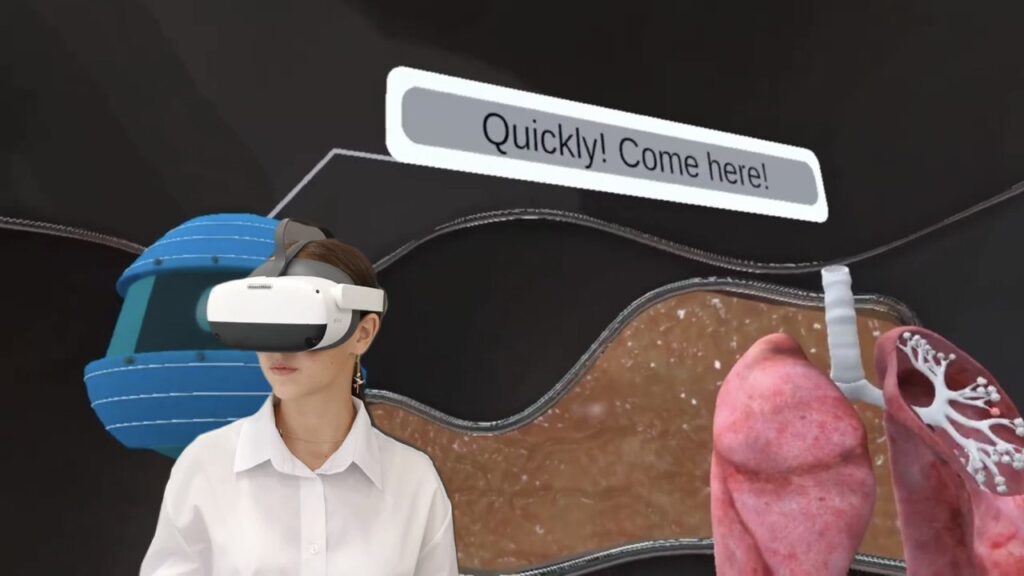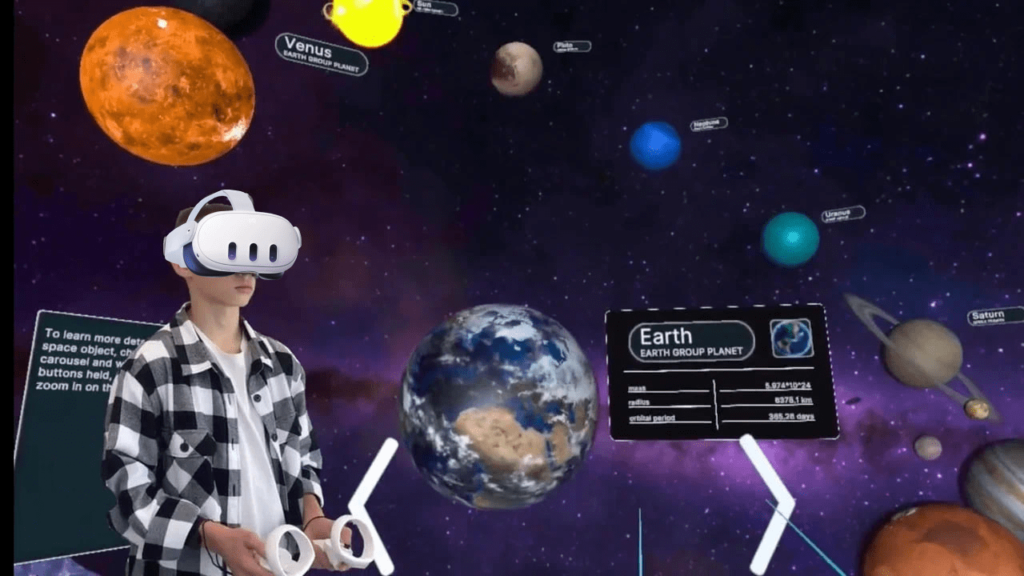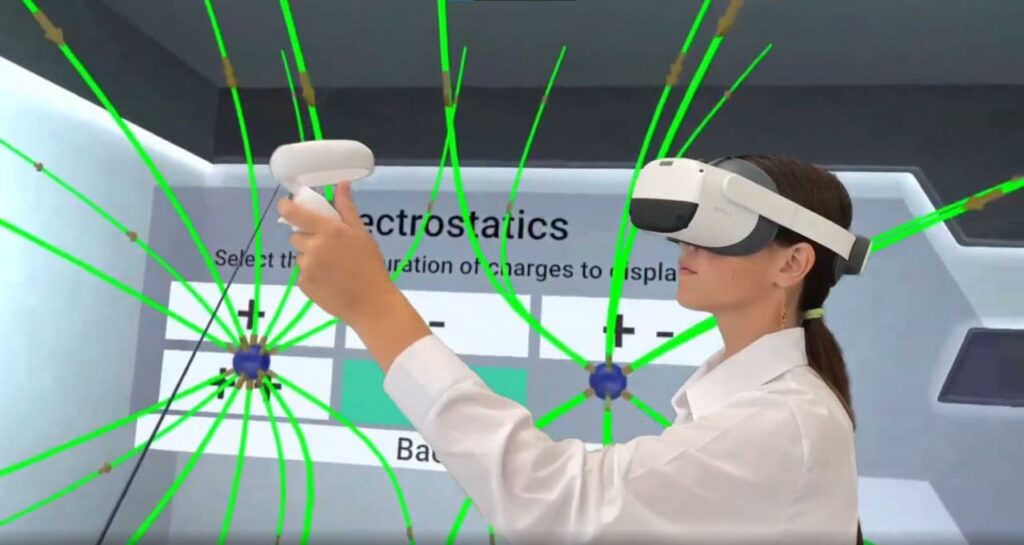

The landscape of education is undergoing a significant transformation, and virtual reality (VR) is at the forefront of this change. Meta, the company behind the Meta Quest VR headsets, has announced an exciting new initiative called Meta for Education. This program is designed to integrate VR technology into classrooms, making learning more interactive, immersive, and effective across various subjects like science, medicine, history, and language arts.
In April, Meta unveiled plans for a new educational offering tailored for Meta Quest headsets. Now, they are launching the Meta for Education beta program in collaboration with over a dozen colleges and universities in the United States and the United Kingdom. Participating institutions include:
These institutions will have the opportunity to test and provide feedback on Meta for Education ahead of its official launch, helping to shape the future of virtual reality in education.
Meta recognizes that virtual and mixed reality technologies have the potential to transform learning experiences. By leveraging VR, educators can create interactive classroom environments that go beyond traditional teaching methods. Students can embark on virtual field trips to distant museums, participate in risk-free hands-on training, and immerse themselves in scenarios that deepen understanding and retention.
Kim Grinfeder, a professor at the University of Miami and the University XR Initiative Lead, shared her enthusiasm:
“The first time I put on a headset, it was immediately apparent to me that this is not like a screen or TV. It had a completely different feeling. We were creating experiences. I immediately recognized this as a tool that’s going to change education—change the way we teach. It allows us to bring the world into the classroom.”

The integration of VR in the classroom has been linked to improved learning outcomes. For instance, Morehouse College observed a 10% increase in attendance rates and an 11% improvement in student achievement and grades after incorporating VR technology. Virtual reality learning not only broadens students’ horizons but also helps them better understand diverse perspectives, potentially reducing bias and fostering empathy.
Rubén Durán, Director of Houston Community College’s Reality CoLab, noted:
“Students are engaging with the technology in meaningful ways. With our project Virtual Reality for Empathy, we invite community organizations, and members of the community and HCC students come to the lab and role-play to raise awareness and enhance student achievement and experiences that are unknown to the person participating. This immersion creates emotions that we think is the initial step to create empathy.”
VR technology has long been valuable in fields like medicine, allowing doctors, nurses, and students to gain hands-on experience with emergency situations in a safe environment. Now, this principle is extending to education more broadly. Virtual reality in education unlocks access to rare experiences and opportunities that would otherwise be out of reach due to physical, financial, or logistical constraints.
Dr. Sean Hauze, Senior Director of Instructional Technology at San Diego State University, explained: “We’re not replacing things that we can do in person, like have dialogues and face-to-face interactions, but we’re exploring things like going into outer space and observing the Earth and the phases of the moon from that perspective, or going underwater or across international boundaries. We’re empowering students to do things that would be out of reach otherwise.”

Schools embracing virtual reality education report numerous benefits, including:
Thomas Merrick, Associate Director of VR/AR Initiatives at the University of Miami, emphasized the importance of early adoption: “We’re trying to normalize the use of extended reality. We fully believe that XR is going to be ubiquitous—as ubiquitous as laptops are today. If not for the students learning about it early on, it won’t be as effective as it could be moving forward.”
The Meta for Education beta program is not just about introducing new technology; it’s about collaborating with educators to refine and improve the product. By receiving direct feedback from teachers, trainers, and administrators, Meta aims to tailor their offerings to meet the specific needs of educational institutions.
Andrew Sedillo, Director of Microcredentials Instructional Design at New Mexico State University, shared his positive experience: “We’ve been very fortunate to beta test a lot of the early prototypes of these programs. Meta checks in with us—they’re asking us what they can do to improve the products, and they’re actually listening. Because of that, we’ve developed a lot of trust with Meta because we understand that they’re putting out a product that’s going to impact educators in a positive way.”
Dr. Muhsinah Morris, Metaversity Director at Morehouse College, added: “I’m really happy to be pioneering this with Meta and that Meta chose to partner with us and not assume that they had all the answers. Allowing us to beta test is giving you better insight on how to make the product better for us. That will help it be more widely adopted: People will know that it was built with educators that are just like them, that you cared enough to take our input in, and that you heard us and listened and iteratively changed because of it.”

As we move towards the next computing platform, collaboration between tech companies, educational institutions, creators, and developers is crucial. Monica Arés, Executive Director of Imperial IDEA Lab at Imperial College London, encapsulated this vision: “This moment is greater than any one institution or one company. We need to come together in collaboration across the creators, the developers, educational institutions, research organizations, and tech companies to build this new learning ecosystem because it’s going to benefit every individual and industry. We’re finally at a place where we have a way to combine the digital and physical worlds, and it’s unlocking this entirely new set of tools, which is what makes all of this so exciting.”
At XReady Lab, we share Meta’s commitment to transforming education through virtual reality learning. Our VR biology, VR physics, and VR chemistry applications provide immersive experiences that enhance understanding and engagement in STEM subjects. By integrating VR into your digital classroom, you can offer students interactive and engaging learning opportunities that prepare them for the future.
Discover how VR can revolutionize your educational offerings. Experience firsthand the benefits of incorporating virtual reality in the classroom.
👉 Request your free demo today and take the first step towards creating an interactive, immersive, and effective learning environment.
Embrace the future of education with VR technology. Let’s transform learning experiences together.
Frequently Asked
We prodive VR biology, VR physics, and VR chemistry simulations. Please, check our catalog.
Please, fill the form to get demo labs for free.
Please contact our customer support service at support@xreadylab.com or book a call with the team to find out the conditions and book the VR class set up at your school.
Subscription to XReady Lab interactive VR labs. If you are a school, then you are also given access to the VR classroom system. VR class system helps you easily launch VR lessons for a large number of students, follow the experience of each student, as well as customise the content without developers.
We adhere to the world’s generally accepted recommendations and research. Our products are suitable for children from 12 years old.